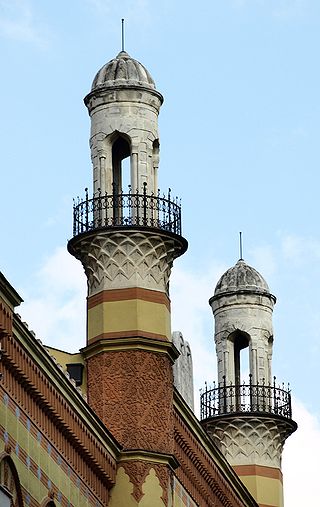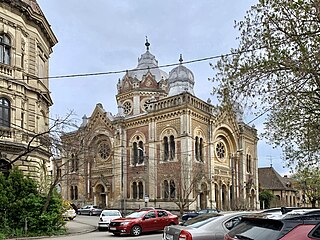Status Quo Ante Synagogue may refer to:
Terminus may refer to:
Status, is a state, condition, or situation, and may refer to:
Status quo is a Latin phrase meaning the existing state of affairs, particularly with regard to social, political, religious, scientific or military issues. In the sociological sense, the status quo refers to the current state of social structure or values. With regard to policy debate, it means how conditions are contrasted with a possible change. For example: "The countries are now trying to maintain the status quo with regard to their nuclear arsenals." To maintain the status quo is to keep things the way they presently are.
Status quo ante may refer to:
Antebellum, Latin for "before war", may refer to:
The term status quo ante bellum is a Latin phrase meaning "the situation as it existed before the war". The term was originally used in treaties to refer to the withdrawal of enemy troops and the restoration of prewar leadership. When used as such, it means that no side gains or loses any territorial, economic, or political rights. This contrasts with uti possidetis, where each side retains whatever territory and other property it holds at the end of the war.
SQA may refer to:

Neologs are one of the two large communal organizations among Hungarian Jewry. Socially, the liberal and modernist Neologs had been more inclined toward integration into Hungarian society since the Era of Emancipation in the 19th century. This was their main feature, and they were largely the representative body of urban, assimilated middle- and upper-class Jews. Religiously, the Neolog rabbinate was influenced primarily by Zecharias Frankel's Positive-Historical School, from which Conservative Judaism evolved as well, although the formal rabbinical leadership had little sway over the largely assimilationist communal establishment and congregants. Their rift with the traditionalist and conservative Orthodox Jews was institutionalized following the 1868–1869 Hungarian Jewish Congress, and they became a de facto separate denomination. The Neologs remained organizationally independent in those territories ceded under the terms of the 1920 Treaty of Trianon, and are still the largest group among Hungary's Jews.
Quo may refer to:
Winner(s) or The Winner(s) may refer to:
Tripartite means composed of or split into three parts, or refers to three parties. Specifically, it may also refer to any of the following:

The Rumbach Street synagogue is located in Belváros, the inner city of the historical old town of Pest, in the eastern section of Budapest. The synagogue in Rumbach Street was built in 1872 to the design of the Viennese architect Otto Wagner. Intentionally meant to serve the members of the Neológ community of Pest, its construction coincided with the Schism in Hungarian Jewry of 1869, and it became the home of the more conservative Status Quo faction.

"Jump That Rock (Whatever You Want)" is the first single from the repackaged Jumping All Over the World – Whatever You Want, and is the fifth overall single by Scooter from their thirteenth studio album Jumping All Over the World. The song was recorded with British rock group Status Quo, featuring their hit "Whatever You Want".

The Fabric Synagogue is a Neolog synagogue in the Fabric district of Timișoara. The synagogue was called the New Synagogue because it replaced the old synagogue on Timocului Street. It was built between 1897 and 1899 in an eclectic style, with neo-Moorish, Gothic and Italian neo-Renaissance elements.
Status quo is a Latin phrase meaning "the existing state of affairs".

The Status Quo Ante Synagogue in Trnava was completed in either 1891 or 1897 at Halenárska Street in Trnava, Slovakia. The synagogue was built in the Moorish-Byzantine style. The city had two Jewish congregations: an Orthodox and a Status Quo one; the building served the latter. The synagogue was devastated in World War II. Today the synagogue is the center of contemporary art, housing the Ján Koniarek gallery, and hosts a number of exhibitions and concerts.
It's All About You may refer to:

The Schism in Hungarian Jewry was the institutional division of the Jewish community in the Kingdom of Hungary between 1869 and 1871, following a failed attempt to establish a national, united representative organization. The founding congress of the new body was held during an ongoing conflict between the traditionalist Orthodox party and its modernist Neolog rivals, which had been raging for decades.

The Synagogue Status Quo Ante from Târgu Mureș, located at No. 24, Aurel Filimon street, is the religious and cultural centre for the small Jewish community in the city of Târgu Mureș and its environs. It was originally constructed during the Austro-Hungarian period, in 1899–1900, in an eclectic architectural style.
"Status Quo" or "Status Quo Ante" is a term applied to certain Jewish communities in Hungary and, later, the region of Northern Transylvania of Romania after the Hungarian General Jewish Congress of 1868–69. Specifically, the term references communities which, after the schism, opted to join neither the Neologist organization – nor the Orthodox communities – and instead decided to retain their previous status(es). They remained without a collective organization or a formally recognized central organization until 1927–28. The term was first used in a newspaper column on 22 February 1871.